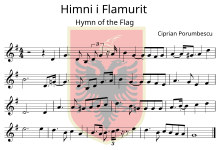Himni i Flamurit
| English: 'Hymn to the Flag' | |
|---|---|
 Sheet music | |
National anthem of Albania | |
| Lyrics | Asdreni, 1912 |
| Music | Ciprian Porumbescu, c. 1883 |
| Adopted | 28 November 1912 |
| Audio sample | |
Instrumental rendition in A-flat major by the U.S. Navy Band (single verse) | |
"Himni i Flamurit" ('Hymn to the Flag') is the national anthem of Albania, adopted in 1912. Its music is derived from the Romanian patriotic song "Pe-al nostru steag e scris Unire", composed by Ciprian Porumbescu.[1] The lyrics, was written by Albanian poet Asdreni. The anthem was originally titled "Betimi mbi Flamur" ("The Pledge on the Flag").[2]
History
On 21 April 1912, "Betimi mbi Flamur" was first published as a poem in Liri e Shqipërisë (Freedom of Albania), an Albanian newspaper in Sofia, Bulgaria. It was later printed in a volume of poems by Drenova titled Ëndra e lotë (Dreams and Tears) which was published in Bucharest. According to Lasgush Poradeci's memoirs, the anthem, created by the adaptation of the text to the music, was not originally intended to be a national anthem, but it was so well liked by the people that it was proclaimed as the national anthem in 1912, and it was with its music that the Albanian flag was raised during the Albanian Proclamation of Independence in Vlore.[2]
Music
A Hungarian composer, György Ligeti, opined that the music composed by Porumbescu is rooted in Germanic and Austrian musical traditions, though this is not a definitive groundbreaking explanation of its influence and later creation. It is a view based on Porumbescu's musical education, since he had studied at the University of Music and Performing Arts, Vienna. The view has been shared by Albanian musicologist, Ramadan Sokoli.[2]
Lyrics
The second half of each verse is considered refrain and is repeated. Usually only the first stanza of the anthem is performed, such as during sporting events.
| Albanian original[3][4][5] | English translation | ||||
|---|---|---|---|---|---|
|
Around our flag united we stand, |
In other alphabets
Albanian has historically been written in a number of different alphabets, and alternate alphabets are used to write different Albanian dialects.[h]
| Arvanitic alphabet | Elifba alphabet | Elbasan alphabet |
|---|---|---|
Ρ̇εθ φλαμȣριτ τε̱ πε̱ρπ̇ασ̈κȣaρ' |
رّاث فلامورىت ت پرباشكوأر |
𐔚𐔇𐔞 𐔉𐔐𐔀𐔒𐔟𐔙𐔍𐔝 𐔝𐔈 𐔗𐔈𐔙𐔁𐔀𐔜𐔏𐔟𐔀𐔙 |
Notes
- ^ Atij ('it') is sometimes replaced with atje ([a.tjɛ]; 'there'),[6] and duke u is sometimes written duk' iu,[7][3] duk' ju[8][9] or similar.
- ^ a b Po ('but') is sometimes written por,[10][6] an ancestral form.[11]
- ^ Alongside the standard form vend ('place') one can also find the variant vënd,[5][6] found in most Tosk dialects, with which the lyrics were originally written, as evidenced by the now lost rhyme with kënd.
- ^ Për ('for') is sometimes written pë,[3][8] and atdheun ('homeland') is sometimes written atdhenë.[8][12]
- ^ Apostrophes represent the elision of word-final ë's, and representation of this among different sources varies.
- ^ See Help:IPA/Albanian and Albanian phonology.
- ^ Only when the first verse alone is performed.
- ^ See Albanian alphabet and its references.
References
- ^ "Himni kombëtar". 2009-10-26. Archived from the original on October 26, 2009. Retrieved 2013-03-25.
- ^ a b c Tole, Vasil. "Edhe një herë rreth himnit tonë kombëtar". Archived from the original on 8 June 2023. Retrieved 17 November 2014.
- ^ a b c "Himni I Flamurit". teksteshqip. Archived from the original on 2019-08-19. Retrieved 2019-08-19.
- ^ Canco, Dhimitër (1999). Epiri: vështrim historik dhe etnografik (in Albanian). Botimet Toena. ISBN 978-99927-1-180-4.
- ^ a b "Hymni Shqiptar [Albanian Anthem]". Albcan.ca (in Albanian). Shoqata Bashkesia Shqiptaro Kanadeze [Albanian Canadian Community Association]. Archived from the original on 2018-09-04. Retrieved 2019-08-19.
- ^ a b c Italy. Esercito. Corpo di stato maggiore. Ufficio propaganda (1941). Per te, solidato d'Albania (in Italian). p. 41.
- ^ Shkurtaj, Gjovalin; Hysa, Enver (2001). Gjuha shqipe për të huajt dhe shqiptarët jashtë Atdheut (in Albanian). Botimet Toena. p. 274. ISBN 978-99927-1-454-6.
- ^ a b c Albania (2002). Fletorja zyrtare e Republikës së Shqipërisë: botim i Kuvendit Popullor (in Albanian). Kuvendi. p. 1427.
- ^ Dako, Christo Anastas (1920). Mjeshtërija për të mësuarë gjuhën Anglisht (in Albanian). p. 86.
- ^ Demo, Constantine A. (1960). Shqipëtarët Në Amerikë: Imigrantët E Parë. Society "Fatbardhësia" of Katundi. p. 95.
- ^ Makartsev, Maxim (2020-12-11). "Grammaticalization of Progressive Aspect in a Slavic Dialect in Albania". Journal of Language Contact. 13 (2): 428–458. doi:10.1163/19552629-bja10012. ISSN 1955-2629. S2CID 234549830.
- ^ Canco, Dhimitër (1999). Epiri: vështrim historik dhe etnografik (in Albanian). Botimet Toena. p. 92. ISBN 978-99927-1-180-4.
